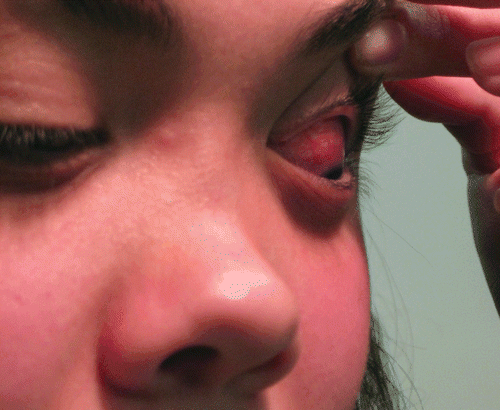Dear Editor,
Relapsing polychondritis (RPC) is a rare immune-mediated condition occurring at nearly all ages. It is characterized by inflammation in cartilaginous structures and other tissues throughout the body, particularly the ears, nose, eyes, joints, and respiratory tract. Ocular disease is a frequent problem in RPC, affecting up to 22% of patients at presentation and approximately 60% at some time during the course of the disease. The most common ocular findings in RPC are scleritis, uveitis, peripheral ulcerative keratitis, conjuntival lesions, and/or proptosis.Citation1,Citation2 In most patients, relapsing polychondritis assumes a fluctuating but progressive course in which polycyclic bouts of inflammation eventually lead to the permanent destruction of the involved structure, resulting in a significant shortening of life expectancy.Citation3 The goal of treatment in RPC is to abate current symptoms and to preserve the integrity of cartilaginous structures and visual function. No form of therapy has been shown to modify the natural history of the disease, although successful remission of inflammation can be achieved upon anti-inflammatory and immunosuppressive agents. The rarity of RPC has not allowed clinical trials to determine the efficacy and safety of different therapies.
We present a case that may add some information about the better response to azathioprine treatment than to other immunosuppressive drugs for scleritis in RPC setting.
In May 2003, a 9-year-old female was sent to our ophthalmology clinic with a 10-day history of pain, redness, and visual loss in her left eye (). Previous medical history was unremarkable and she had no family history of autoimmune diseases. Clinical diagnosis of diffuse non-necrotizing anterior scleritis was done. At that time, physical examination was otherwise normal. Laboratory workup of autoimmune and infectious diseases was negative, including antinuclear antibodies (ANA), antineutrophil cytoplasmic antibodies (ANCA), anti DNA antibodies, rheumatoid factor, human leukocyte antigen B-27 (HLA B-27), indirect fluorescence assay (IFA) for Bartonella henselae, and enzyme-linked immunosorbent assay (ELISA) for Toxoplasma gondii. Hemogram, urinalysis, and complement levels C3 and C4 were normal.
We started prednisone 20 mg/daily and complete remission was achieved in 6 months. The scleritis remained inactive for 3 years after stopping all medication. At age 12, the patient had a new episode of scleritis in her right eye. Treatment with systemic steroids and methotrexate 12.5 mg/week achieved partial response. When the steroids were tapered to 5 mg/day she had a new flare-up of the disease. Methotrexate was replaced by mycophenolate 2 g per day. Despite this treatment, recurrent episodes of scleritis persisted over the next 2 years of treatment, so mycophenolate was replaced by azathioprine 50 mg/daily, achieving remission of the scleritis 3 months later. The patient has had normal vision and been symptom-free after 14 months of follow-up under azathioprine treatment.
We observed arrested development of nasal cartilage at age 13, with progressive saddle-nose deformity. In 2008, we made the clinical diagnosis of relapsing polychondritis according to Michet’s criteria,Citation4 after evaluation by an ear, nose, and throat (ENT) specialist.
To the best of our knowledge there are no treatment outcome reports using azathioprine for RPC in a pediatric setting. This case adds information to the data obtained from the Systemic Immunosuppressive Therapy for Eye Diseases (SITE) Cohort Study, which suggests that the addition of methotrexate has a moderate chance of achieving control of inflammation,Citation5 not supporting its effectiveness over mycophenolate or azathioprine in ocular inflammatory diseases. Relapsing polychondritis is no respecter of age and it is important when treating scleritis with disease-modifying agents such as azothioprine to change to another drug if the current regime is not working. This pediatric-onset RPC, with a long follow-up, achieved remission using azathioprine as monotherapy after multiple treatment failure, without significant systemic side effects.
Declaration of interest: The authors report no conflicts of interest. The authors alone are responsible for the content and writing of the paper.
REFERENCES
- Isaak BL, Liesegang TJ, Michet CJ Jr. Ocular and systemic findings in relapsing polychondritis. Ophthalmology. 1986;93:681–689.
- Kent PD, Michet CJ Jr Luthra HS. Relapsing polychondritis. Curr Opin Rheumatol. 2004;16:56–61.
- Gergely P Jr, Poór G. Relapsing polychondritis. Best Pract Res Clin Rheumatol. 2004;18:723–738.
- Michet CJ Jr, McKenna CH, Luthra HS, O Fallon WM. Relapsing polychondritis: survival and predictive role of early disease manifestations. Ann Intern Med. 1986;104:74–78.
- Gangaputra S, Newcomb CW, Liesegang TL, et al. Methotrexate for ocular inflammatory diseases. Ophthalmology. 2009;116:2188–98.
